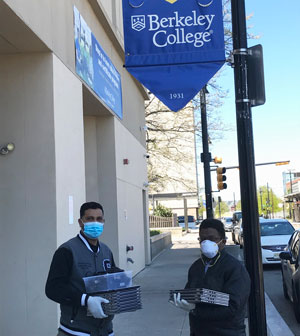Berkeley College Ships Laptops to New Students
- By Dian Schaffhauser
- 05/01/20

Berkeley College public safety staff prepare to distribute laptop computers to students at the start of the spring semester. Source: Berkeley College
Berkeley College resumed its spring semester this week with online courses. To make sure students had access to computing devices, the private for-profit school, with locations in New York and New Jersey, handed out free laptops to all new incoming students. Most of the devices were shipped directly to students' homes.
During the winter semester, the college distributed free loaner laptop computers to students who requested them, to simplify the transition to all-online classes. Those who continued their studies into the new semester were allowed to keep those.
The college has made its student support services — including the library, academic advising, counseling, career services, campus life, disability services and others — available virtually. During the latest semester, the school also expects to host virtual career fairs with employers to help students with job searches and conduct webinars to help students prepare for interviews.
To encourage students to keep up with wellness activities, the Office of Student Development and Campus Life is hosting weekly social events, including open chats on Wednesdays; virtual yoga on Thursdays; and a "feel good Friday" weekly podcast with the Office of Personal Counseling. The Office of Military and Veterans Affairs is producing online group fitness classes and webinars on stress management.
About the Author
Dian Schaffhauser is a former senior contributing editor for 1105 Media's education publications THE Journal, Campus Technology and Spaces4Learning.